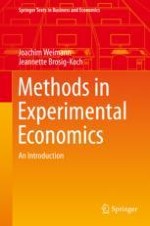2019 | OriginalPaper | Buchkapitel
2. Methodological Foundations
verfasst von : Joachim Weimann, Jeannette Brosig-Koch
Erschienen in: Methods in Experimental Economics
Aktivieren Sie unsere intelligente Suche, um passende Fachinhalte oder Patente zu finden.
Wählen Sie Textabschnitte aus um mit Künstlicher Intelligenz passenden Patente zu finden. powered by
Markieren Sie Textabschnitte, um KI-gestützt weitere passende Inhalte zu finden. powered by
